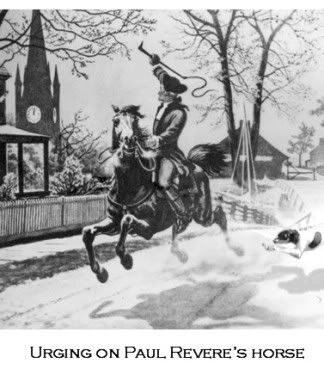
"Listen my children and you shall hear
Of the midnight ride of Paul Revere."
These opening lines to Henry Longfellow's epic poem "Paul Revere's Ride" have been recited in classrooms across this country. In fact, most people only know of Paul Revere thanks to Longfellow’s 1860 poem (almost 100 years after the actual event). Within the historical community, Reveres infamous ride has been scrutinized for its embellished nature. As we know, much of Paul Revere's "ride" was quite different from Longfellow's dramatic portrayal.
First off, we can all rest assured that Paul Revere never shouted, "the British are coming." To have done so would have destroyed the secrecy that was needed for the mission. We can also be certain that Paul Revere was not alone on April 18, 1775. After receiving his initial instructions from Dr. Joseph Warren to warn John Hancock and Samuel Adams of the impending doom, perhaps as many as fifty other riders were caught up in the excitement of the moment and set out to warn the countryside.
While riding across the Boston countryside, Revere was actually detained by the British, had his horse confiscated, and was forced to march back to town at gunpoint. In fact, Revere was never able to reach Adams and Hancock. Fortunately, both men were warned by other riders of the danger that was approaching, as was the militia, which prepared for the infamous Battle of Lexington and Concord.
To be certain, Revere was an important figure inside Boston's revolutionary underground. He had been entrusted by important and influential men to carry out various assignments (one of them being the stained glass portrayal of the "Boston Massacre") and was a honored member of several organizations of influence (the Masonic Lodge in Boston being the most important). Though his infamous ride may be entwined with legend and folklore, Paul Revere's involvement in the early years of Boston's revolutionary fervor are both influential and worthy of further study.
1 comment:
great post my bro
Post a Comment